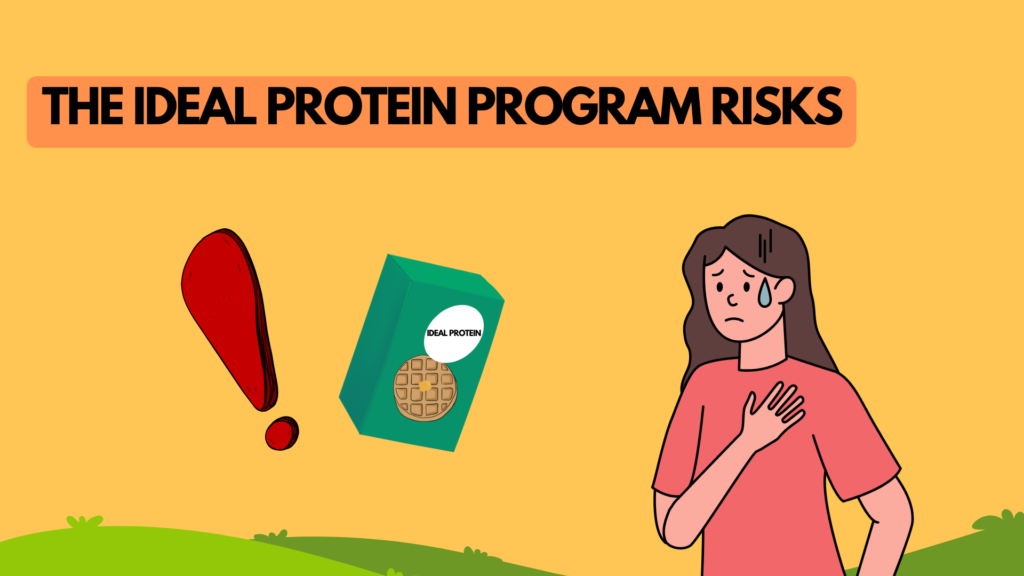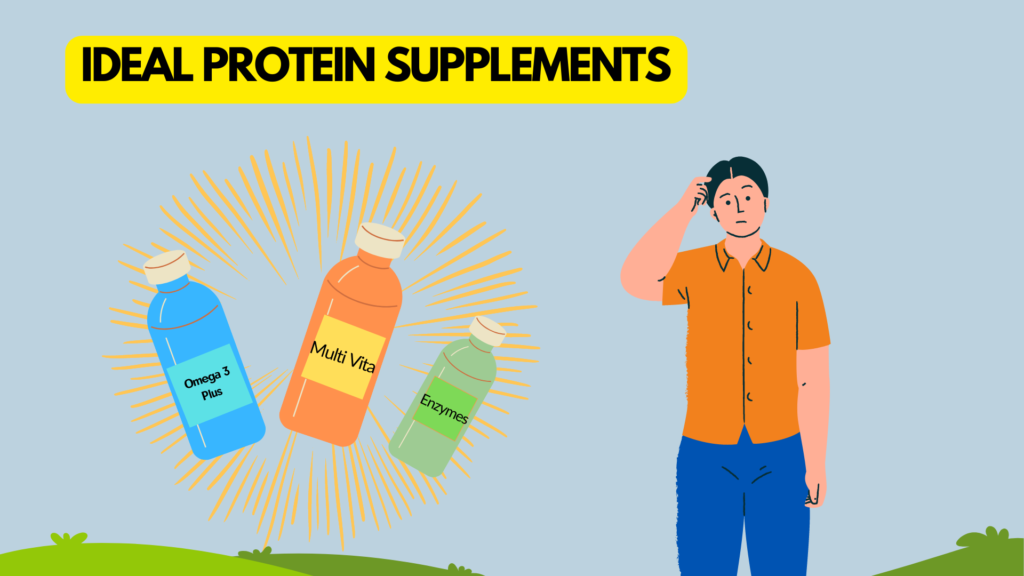If you’re looking for a quick and effective way to lose weight, you may have heard of the Ideal Protein Diet. It’s a high-protein, low-carb diet that claims to help users reach their weight loss goals quickly. But is it really the ideal diet for you? In this article, we’ll take a closer look at the Ideal Protein Diet and discuss some of the potential risks and ideal protein alternatives. We’ll also provide some tips on how to make sure you’re getting the essential nutrients while still staying on track with your weight loss goals.

WHAT IS THE IDEAL PROTEIN PROGRAM?
The Ideal Protein program is a weight loss method that was developed by healthcare professionals and is based on a personalized approach to nutrition. The program consists of a low carbohydrate, moderate protein and fat diet, along with coaching and support to help individuals achieve their weight loss goals. The program has four phases, with each phase progressively increasing the amount of carbohydrates and fats in the diet, allowing individuals to adjust to their new way of eating and helping to ensure the weight loss is sustainable.
One of the key features of the Ideal Protein program is the use of Ideal Protein products, such as meal replacement bars and packets, to support weight loss and provide the necessary nutrients for good health. However, these products can be expensive, and some individuals may prefer to use alternative sources of protein.
There are several ideal protein alternatives available, including high-protein meal replacement shakes and bars, and other low carbohydrate diets. Some popular alternatives include the Atkins diet, the South Beach diet, and the Keto diet. Each of these programs focuses on reducing carbohydrate intake and increasing protein intake, but they may vary in the types of foods they allow and their specific macronutrient ratios.
It is important to remember that weight loss is not a one-size-fits-all approach, and what works for one person may not work for another. Before starting any weight loss program, it is important to speak with a healthcare professional to determine the best approach for your individual needs and health status. This may include considering alternative programs such as the Ideal Protein program or one of its alternatives.
THE IDEAL PROTEIN PROGRAM RISKS

The Ideal Protein Program is a weight loss program that has been around for over 15 years. It is a low-carb plan that focuses on eating high-quality proteins and vegetables and avoiding unhealthy fats and processed carbohydrates. While the program has helped many people reach their weight loss goals, it is not without risk.
The Ideal Protein Program can be restrictive in that it eliminates many of the foods that people would typically consume, such as grains, dairy, and legumes. This can lead to nutritional deficiencies if proper supplementation is not taken. Additionally, the program can be difficult to follow long-term, as it requires strict adherence to the plan. People who don’t follow the program closely may not see the desired results.
In addition to the risks associated with the Ideal Protein Program, there are a number of potential side effects. These can include fatigue, headaches, constipation, nausea, and dizziness. It is important to talk to your doctor before starting any weight loss program, including the Ideal Protein Program.
If you are looking for an alternative to the Ideal Protein Program, there are a number of options available. Low-carb diets such as the ketogenic diet, the Atkins diet, and the Paleo diet are all viable alternatives. These diets focus on eating whole, unprocessed foods, such as vegetables, fruits, nuts, seeds, and healthy fats, while avoiding processed carbohydrates, sugar, and unhealthy fats. Additionally, there are meal-delivery programs that provide pre-made meals that adhere to various dietary restrictions, such as low-carb and low-calorie diets.
Phase One of the Ideal Protein Program
Phase One of the Ideal Protein program is the first and most strict phase of the program. It is designed to kickstart weight loss by drastically reducing carbohydrate intake and increasing protein intake. This phase usually lasts 2-4 weeks, depending on an individual’s starting weight and their weight loss goals. During this phase, individuals consume mainly Ideal Protein products, such as meal replacement bars and packets, along with limited amounts of non-starchy vegetables. The goal of Phase One is to establish a foundation for weight loss and to teach individuals the principles of healthy eating.
One of the benefits of Phase One is the rapid weight loss that can be achieved. This can help to motivate individuals and give them a sense of accomplishment. However, it is important to remember that this phase is not meant to be a long-term way of eating, and that the goal is to transition to a more balanced diet in the later phases of the program.
It is important to note that Phase One can be challenging for some individuals, as it requires a significant change in eating habits and a commitment to following the program strictly. Those who have difficulty following the program or who do not see results may consider alternative weight loss methods, such as the Atkins diet, the South Beach diet, or the Keto diet, which also focus on reducing carbohydrate intake and increasing protein intake.
However, it is important to remember that these alternative programs may not have the same level of support and coaching as the Ideal Protein program, and it is recommended to speak with a healthcare professional before starting any new weight loss program. This includes considering ideal protein alternatives, as different programs may have different requirements and may not be suitable for everyone.
Phase Two of the Ideal Protein Program
Phase Two of the Ideal Protein Program is the transition phase, where dieters are introduced to a variety of healthy lifestyle choices and maintenance tools. During this phase, dieters are encouraged to increase their protein intake and reduce their carbohydrates. Additionally, the program encourages dieters to take advantage of their newfound knowledge about nutrition and to make lifestyle choices that will help them to maintain their weight loss.
During this phase, dieters learn about a variety of healthy foods and how to incorporate them into their daily diet. They also learn how to read nutrition labels and how to make informed decisions about the foods they eat. Furthermore, dieters are introduced to ideal protein alternatives such as lean meats, fish, eggs, legumes, and nuts.
In addition to introducing dieters to healthy foods and lifestyle choices, the Ideal Protein Program provides goal setting and maintenance tools. Dieters are encouraged to create personalized goals that will help them to stay on track and continue to make healthy choices. The program also helps dieters to develop a personalized maintenance plan that will help them to maintain their weight loss and healthy lifestyle. This plan includes meal planning, exercise recommendations, and lifestyle reminders.
The Ideal Protein Program also provides ongoing support and counseling. Dieters have access to a team of certified health coaches and dieticians who can help them to stay on track and make sure that they are following the program’s guidelines. This team can also provide dieters with tips and ideas for healthy meals and snacks, as well as advice on how to stay motivated and make the most of the program’s resources.
Phase Three of the Ideal Protein Program
Phase Three of the Ideal Protein Program is a crucial step in the journey towards a healthier lifestyle. This stage is designed to teach participants how to maintain their weight loss and transition to a more balanced lifestyle. During this phase, participants will continue to follow a low-carbohydrate diet but will begin to reintroduce carbohydrates to their diet.
During Phase Three, Ideal Protein participants will begin to learn how to identify and incorporate healthy carbohydrates and ideal protein alternatives into their diet. This is done through the introduction of “Smart Carbs”, such as whole grains, fruits, and starchy vegetables. Additionally, participants are encouraged to introduce healthy fats and proteins into their diet through the inclusion of lean meats, fish, eggs, low-fat dairy, nuts, and seeds.
In addition to introducing healthy carbohydrates and ideal protein alternatives, Phase Three also emphasizes the importance of physical activity. Participants are encouraged to incorporate regular exercise into their routine in order to maximize the health benefits of their weight loss. Exercise is an essential component of a healthy lifestyle and can help to maintain weight loss, improve mood and energy levels, and reduce the risk of chronic diseases.
Lastly, Phase Three also focuses on education and lifestyle change. Participants learn how to make healthy food choices and identify sources of unhealthy cravings. They also learn how to develop healthy eating habits and how to make better lifestyle choices.
Overall, Phase Three of the Ideal Protein Program is an important step in the journey towards a healthier lifestyle. By introducing healthy carbohydrates and ideal protein alternatives and emphasizing the importance of physical activity and lifestyle change, this phase is designed to help participants maintain their weight loss and lead a more balanced life.
Phase Four of the Ideal Protein Program
Phase Four of the Ideal Protein Program is the final step in a weight-loss journey. This phase allows individuals to maintain their weight-loss and establish new lifestyle habits to keep the weight off. There is no calorie counting or restricted eating during this stage, but individuals will still need to make sure that their meals include the necessary nutrients for their body to remain healthy.
During Phase Four, individuals are encouraged to continue eating the Ideal Protein alternatives such as lean proteins, healthy fats, and low-glycemic carbohydrates. It is important to eat meals that will provide the body with sustainable energy and help maintain proper blood sugar levels.
Additionally, individuals should aim to reduce their intake of processed foods and choose whole-food options whenever possible. It is also important to establish an exercise routine that is tailored to the individual’s lifestyle and health goals. Exercise can help individuals maintain their current weight and prevent weight gain in the future.
During this phase, individuals should focus on creating a healthy relationship with food and understanding what their bodies need. It is also important to build a network of support and stay connected with friends and family. With the help of the Ideal Protein Program, individuals can reach their goal weight and maintain a healthy lifestyle for the long-term.
IDEAL PROTEIN SUPPLEMENTS

Ideal Protein (IP) is a weight loss and weight management program that requires participants to take a variety of supplements including multivitamins, antioxidants, enzymes, potassium, and magnesium, all of which are under the Ideal Protein brand. In addition, the program requires participants to consume 1/4 teaspoon of salt per day, which must be the Ideal Protein brand of salt. These supplements, along with the food required by the program and the program itself, come at a cost of approximately $350 per month.
While the program provides research studies to support its approach, it’s worth noting that these studies do not specifically mention the Ideal Protein diet. Instead, they focus on the impact of weight loss on various diseases and conditions. It would be beneficial to see peer-reviewed studies with solid methodology showing the long-term weight loss outcomes for Ideal Protein clients.
The program includes testimonials from doctors, but it’s important to remember that many doctors may have a financial incentive to promote the program. There is a trend of doctors using their medical credentials to sell unproven and potentially harmful diets, and this can be misleading to the public. Doctors also sometimes prescribe restrictive diets without considering the impact on the patient’s life or the difficulty of sustained weight loss. This can lead to unsustainable eating patterns and weight loss.
In conclusion, it’s important to approach weight loss and weight management programs with a critical eye and to understand that those promoting these programs may have financial incentives. It’s always recommended to seek the advice of a registered dietitian or a healthcare professional before starting any new program.
IDEAL PROTEIN PROGRAM WHISTLEBLOWER
The program focuses on rapid weight loss achieved through a combination of low-carbohydrate and high-protein foods. In some cases, the program has been linked to a number of health problems, including fatigue, headaches, dizziness, and digestive issues. The whistleblower has raised a number of concerns over the program, including its lack of medical oversight, its potential for abuse, and its potential to cause long-term health issues.
The whistleblower’s claims have been met with both criticism and support. Critics have argued that the program is not backed by medical evidence, and that it could be dangerous for some people to follow. Supporters of the program, however, insist that the program is safe and effective, and point to its success in helping people lose weight quickly.
Despite the controversy, the Ideal Protein Program has gained popularity among those looking for fast weight loss results. However, the whistle-blower’s warnings may be a sign that the program should not be taken lightly. As an alternative, some suggest a more balanced approach to weight loss, such as reducing calorie intake and increasing physical activity.
For those looking for alternatives to the Ideal Protein Program, there are a number of options available. For instance, the Mediterranean Diet is a balanced approach to healthy eating that emphasizes fruits, vegetables, whole grains, legumes, nuts, and healthy fats. Another alternative is the Flexitarian Diet, which includes a variety of plant-based foods and moderate amounts of animal protein. Additionally, the Whole30 Diet focuses on eating whole, unprocessed foods for a 30-day period.
Here is a list of Ideal Protein (IP) weight loss supplements that are commonly recommended as part of the IP weight loss program:
- Multivitamins
- Antioxidants
- Enzymes
- Potassium
- Magnesium
- Ideal Salt
THE IDEAL PROTEIN DIET, IN SHORT:
The Ideal Protein Diet is a diet plan that is designed to help people lose weight quickly and efficiently. It is a high protein, low carb diet that focuses on eating proteins such as eggs, fish, and lean meats. The goal of the Ideal Protein Diet is to help people reduce their overall calorie intake while still providing the necessary nutrients.
One of the major pros of the Ideal Protein Diet is that it allows for a rapid weight loss. By following the plan, dieters can lose up to 2 pounds per week. The diet also helps to reduce cravings due to its high protein content, making it easier for dieters to stay on track and reach their goals. Additionally, the Ideal Protein Diet is designed to balance the body’s blood sugar levels, which can help to reduce the risk of diabetes and other health conditions.
However, there are also some cons to the Ideal Protein Diet. The diet is not sustainable over the long-term as it is difficult to maintain the same levels of protein and low-carb intake. Additionally, the diet can be expensive due to the cost of the supplements and meal replacements that must be purchased in order to make the diet work. Lastly, the diet does not include a lot of variety, so dieters may become bored with the same meals over time.
For those looking for ideal protein alternatives, there are other low-carb, high-protein diets available. These include the Atkins Diet, the Paleo Diet, and the Keto Diet. Each of these diets has its own set of pros and cons and should be carefully researched before beginning. Additionally, some people may find that a combination of different diets or meal plans is the best way to achieve their weight loss goals.






